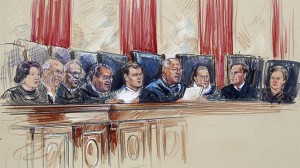Mark October 8 on your calendar – that’s when the Supreme Court will hear arguments in a case that’s being called Citizens United 2.0.
The case, McCutcheon v. Federal Election Commission, will test the constitutionality of limits on individual donations to candidates, parties and PACs. Under current law, a person can give up to $46,200 for federal candidates and $70,800 for parties and independent committees during a two-year election cycle.
With the support of the Republican National Committee, Shaun McCutcheon, a wealthy conservative donor from Alabama, is challenging the limits, arguing that they’re “unsupported by any cognizable government interest.”
A lower court disagreed, ruling that “the government may justify aggregate contribution limits as a means of preventing corruption or the appearance of corruption.” Similar arguments were made when Citizens United was litigated, and the Supreme Court’s conservative majority wasn’t swayed.
Speaking about the impact of Citizens United at a 2010 conference, Rep. Alan Grayson, D-Florida, put the issue in stark terms. “We’re now in a situation,” he told the crowd, “where a lobbyist can walk into my office…and say, ‘I’ve got five million dollars to spend, and I can spend it for you or against you. Which do you prefer?’” If the court agrees with Shaun McCutcheon, wealthy individuals would hold the same power.
For more information, or to support a petition opposing the further evisceration of our campaign finance laws, see this post at Demos.


